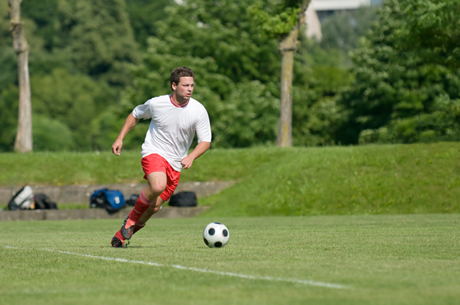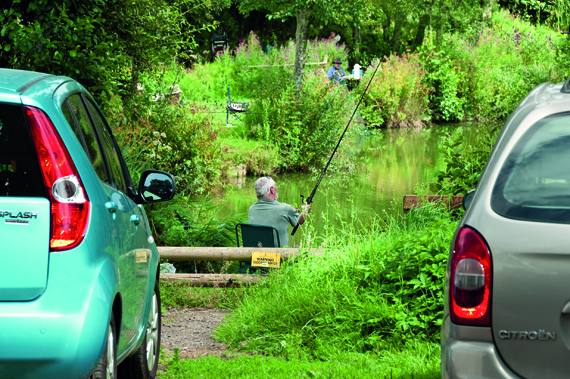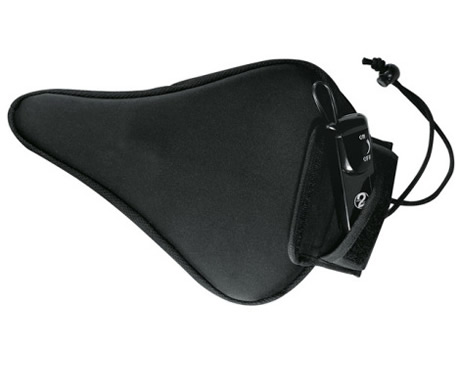
"My 8th grade son plays soccer. He is 5-foot-6 and weighs 108 pounds. He thinks drinking Muscle Milk will provide stronger muscles and make him a better runner."
"No matter what I eat, I cannot seem to gain weight. What am I doing wrong?"
"How many extra calories do I need to gain weight...?"
If you are among the few scrawny soccer players who have a hard time adding some muscle, you may be feeling frustrated you can't do something as simple as gain a few pounds. For soccer athletes who are too skinny, the struggle to bulk up is equal to that of overfat players who yearn to trim down. Clearly, genetics plays a powerful role in why some soccer players have trouble gaining weight (and keeping it on).
Some soccer players are genetically fidgety; they don't like to sit still. Not only are they active with soccer, but they are also active when sitting. For example, when I am counseling skinny clients, I observe them constantly tapping their fingers and shifting around in the chair—activities that burn calories.
More: How Many Calories Do Youth Soccer Players Need?
The technical term for these spontaneous movements is Non-Exercise Activity Thermogenesis or N.E.A.T. NEAT includes fidgeting, pacing while you wait for the bus, standing (not sitting) while you talk with a teammate, being animated when you talk to friends, or tapping your fingers when watching TV. If you overeat, NEAT helps you dissipate excess energy by nudging you to putter around the house, choose to shoot some hoops, or (yikes!) feel motivated to vacuum the house. NEAT can predict how resistant you'll be to gaining weight (1).
Historically, soccer players have been told that consuming an extra 500 to 1,000 calories per day will lead to gain of 1 to 2 pounds per week. Nature easily confounds this mathematical approach. For example, in a weight gain study where the subjects were overfed by 1,000 calories per day for 100 days, some people gained only 9 pounds, whereas others gained 29 pounds (2). NEAT likely explains the difference.
Researchers don't understand the source of this increased activity, but they do know that people with higher VO-2max (a measure of athletic potential) are genetically predisposed to spend more time being active throughout the day. Hence the natural ability to be active for long periods (think soccer players) might be connected to both NEAT and leanness. In contrast, unfit people (with a lower VO2 max; think couch potato) tend to do less spontaneous movement, and that can lead to weight gain (3).
More: How Much Protein Should Players Eat?
Although you cannot change your genetics and your tendency to fidget, you can boost your calorie intake. Here are six tips to help you bulk-up healthfully.
Do NOT skip meals; doing so means you'll miss out on important calories needed to reach your goal! Every day, enjoy a breakfast, an early lunch, a later lunch, dinner, and a bedtime meal.
More: How to Recover From a Hard Practice
Instead of having one sandwich for lunch, have two. Enjoy a taller glass of milk, bigger bowl of cereal, and larger piece of fruit.
By reading food labels, you'll discover that cranapple juice has more calories than orange juice (170 vs. 110 calories per eight ounces); granola has more calories than Cheerios (500 vs. 100 calories per cup); corn more calories than green beans (140 vs. 40 calories per cup).
Instead of quenching your thirst with water, choose calorie-containing fluids. One high school soccer player gained 13 pounds over the summer by simply adding six glasses of cranapple juice (1,000 calories) to his standard daily diet.
More: Soccer Players Don't Have to Give Up Sweets
These foods are high in (healthy) fats, and can be a positive addition to your sports diet by helping knock down inflammation. Their high fat content means they are calorie-dense. Add slivered almonds to cereal and salads, make that PB&J with extra peanut butter, and dive into the guacamole with baked chips (without the 'bad" trans and saturated fats).
Weight lifting and push-ups stimulate muscle growth so that you bulk-up instead of fatten up. Sooner or later, exercise will stimulate your appetite so you'll want to eat. Exercise also increases thirst so you'll want to drink extra juices and caloric fluids.
More: How Much Should Soccer Players Weigh?
Simple guide to choosing the best swims on commercial fisheries

Enjoy Your fishing charters victoria services and benefit

Are These 8 Bicycle Products Real or Practical Jokes?

Copyright © www.mycheapnfljerseys.com Outdoor sports All Rights Reserved